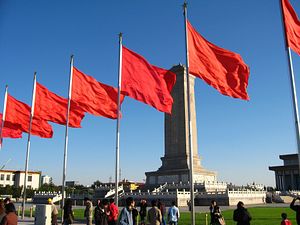U.S. Defense Secretary James Mattis was wrong when he criticized China’s Belt and Road Initiative (BRI) by saying that “the Ming Dynasty appears to be their model, albeit in a more muscular manner, demanding that other nations become tribute states kowtowing to Beijing.” Following this logic, the deduction that China’s rise and its ultimate modernization can be and will be peaceful appears to be completely unacceptable. Mattis is implying that the U.S.-anchored rules can never be changed, destinies can never be shared, and political and cultural diversities can never be allowed.
First, the contemporary Chinese government does not have a so-called “Ming Dynasty model.” In fact, China’s political model and wisdom are deeply rooted in the history of Chinese civilization, which has lasted for thousands of years — describing China as a reviving Ming Dynasty (which lasted from 1368-1644) is thus very parochial.
Second, the idea of “Common Destiny” as the core spirit for the BRI has always been China’s firm commitment. “Common Destiny” embraces diversity and inclusiveness, and it has been adopted by resolutions at the United Nations. It contrasts with the idea and practice of the world’s only superpower, which pursues homogenization throughout the whole world under a single political value system. Those who won’t comply may have to suffer from either political or economic isolation or even military invasion. Which of these “models” is more threatening?
Third, China has never claimed that there can be only one “belt” and one “road.” The truth is that China’s initiative is completely open and inclusive, and it may connect to a number of developmental strategies of other countries and regions, such as the Eurasian Economic Union (including Armenia, Belarus, Kazakhstan, Kyrgyzstan, and Russia), Mongolia’s Development Road Program, the Master Plan on ASEAN Connectivity, and the European Union’s Juncker Plan. In fact, consensus or even agreements have already been made between China and the above countries and regions.
In fact, Mattis’ complaint may have stemmed from a deeper unease. Currently, a sentiment of exasperation seems to have emerged in the West and especially in the United States, complaining that after 40 years of reform, opening up, and modernization, China has yet westernized, although China has been a beneficiary of the Western economic order that was largely constructed by the United States after World War II.
Given the current tensions, it is ironic that during the past decades, the United States has expected China’s economic rise and truly has played a certain role in it. Take the past Sino-U.S. trade relations and China’s membership in international economic institutions as an example. The United States first granted China most-favored-nation (MFN) status in 1980, approved legislation granting China Permanent Normal Trade Relations (PNTR) with the United States in 2000, and finally supported China’s membership in the World Trade Organization (WTO) in 2001. It might be appropriate to say that the United States has more or less helped China to realize its unprecedented economic rise by providing political, economic, and institutional resources, despite varying intentions, policies, and attitudes behind the screen.
However, China’s rise does not comply a typical westernized or a U.S.-favored story line. As China modernizes, it has remained significantly different, in particular with respect to its political system. As Martin Jacques once put it, China proves that the Western belief that “as countries modernize, they also westernize” is simply an illusion.
As a matter of fact, China does not need to and certainly will not westernize. Neither does it need to “revive” any old dynasty, be it the Tang or the Ming. What China actually needs to do is to move forward in its reform and opening up, which President Xi Jinping called “a second revolution that has not only profoundly changed the country but also greatly influenced the whole world.” It would be unrealistic to expect anything more (or less) from Beijing.

































